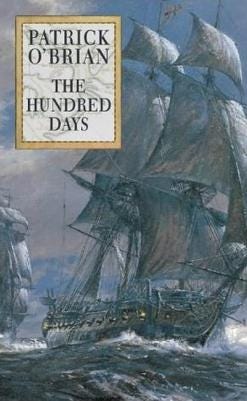The Hundred Days
Manners, mortality, and the late style of the penultimate Aubrey-Maturin novel
It has only been 77 78 days since my last post, but that’s enough for nearly all of the summer to have gone by. Rather than hold out for another 23 22 days for the sake of the round hundred, I thought I’d go ahead and say something, at long last, about the nineteenth novel in Patrick O’Brian’s epic series of historical novels about one Captain Jack Aubrey and his boon companion, Dr. Stephen Maturin. With only one more completed novel in the series, plus the unfinished 21, I’ve found myself reluctant to come to the end of this little project. Fictional characters never truly die, and their stories never truly end—one can always start again, and I have—this would constitute my fourth time through the series, and I see no reason why I might not go for a fifth. A friend of mine just started them—he’s nearly done with Master and Commander—and I could, for example, reread the books alongside him, to see if his fresh reactions stimulate something new. On the other hand, it might be time to stop writing about these books I love so well—to stop doing homework and simply to read for pleasure. I’ll be 53 in October, and if there’s a theme to my midlife it seems to be that it’s time to enjoy things for themselves, and not because I might be able to turn them into some sort of project or product. That goes for writing as well as reading, which is why I’ve let this Substack lapse.
The Hundred Days is bookended by the shocking deaths of major characters. (As usual, I have no compunction about spoilers, so read on at your own risk.) The novel begins, like The Reverse of the Medal, with a pair of never-to-be-seen-again minor characters gossiping about the officers of the Surprise and its squadron as it comes into port. Into the chitchat of these barely named men, a bomb is casually dropped: Diana Maturin, the fiery object of Stephen’s passion and his wife of several years, has died in a coaching accident, taking Jack’s monstrous mother-in-law Mrs. Williams with her. It is all too typical of O’Brian to depict the aftermath of a major plot point rather than the thing itself, but there seems to me something callous about it, something like a punishment. Stephen’s daughter Bridget, we are told, is not very upset about her mother’s death; she is more attached to Jack’s wife Sophie, and to Mrs. Oakes, who at this point is part of the extended family that these novels describe. Other characters who comment upon the marriage describe or dismiss it as unhappy; one of the wharfside gossips calls her “a demi-rep” and references rumors of her unfaithfulness: “it is said the marriage was not a happy one.” Queenie, Jack’s polymath nursemaid turned wife of the Commander-in-Chief, cold-bloodedly remarks: “She was an extraordinarily handsome woman and she had prodigious style: I admired her exceedingly. But she was not a wife for him, nor a mother for that dear little girl.”
What are we to make of this chilly view of the Maturin marriage? As often as we are told of its unsuitability and the general incompatibility of Stephen and Diana, their bond clearly changes and deepens over the course of the series, climaxing with the conclusion of The Commodore, in which Diana entreats Stephen into her bed and urges him never to return to sea. Return he does, of course, and in the novel preceding this one, The Yellow Admiral, O’Brian is already referencing the narrow bridge over which he will send tumbling two of the series’ most memorable women. Women, incidentally, who were not shy about pursuing their own desires; Diana of course is a strongly sexual being, as is Mrs. Williams, though she is far more hypocritical about it. Diana flouted convention and Mrs. Williams worshipped it, but it’s hard not to conclude that O’Brian kills them off for the sin of unbridled desire, of desire in the wrong place. With Diana gone, O’Brian begins maneuvering to set him up with a new paramour, Christine Wood née Heatherleigh, the widow of the Governor of Sierra Leone and, like Stephen, a naturalist. Rumor has it that the Governor was impotent; O’Brian is setting the stage for a new relationship in which sexual and intellectual desires can match and amplify each other. But will there be time? Was it entirely responsible for a writer in his mid-eighties to throw over the romantic chessboard, nineteen novels in, and start again?
One final piece of storyteller’s callousness: Barret Bonden, Aubrey’s coxswain, Stephen’s pupil (he taught him to read), prizefighter and able seaman and all around good man and true, is killed almost as an afterthought in the closing battle with the gold-laden Algerine galley. Look at these sentences:
A long shot: but the combination of good aiming, excellent bore and powder, and the toss of the sea caused the twenty-four-pound ball to strike the second gun of the Surprise’s starboard broadside, killing Bonden, its captain, and young Hallam, the midshipman of the division. Once the gun had been secured Jack ran the length of the battery, checking the captains’ pointing – though indeed the low-lying galley was but the faintest blur – urging highest elevation and then, on the rise, he cried, ‘Fire!’
The colorlessness of this passage seems more like the work of C.S. Forrester or some lesser writer incapable of lavishing the sort of characterization of which O’Brian is capable on a comparatively minor character such as Bonden. Or perhaps it reads as a late-in-the-day manifestation of the No-One-Is-Safe-Ethic symbolized to many readers by the execution of Ned Stark in A Game of Thrones. Yet these novels have always been carried along by the paradoxical structure of the times they depict, in which a high civilization, brimming with self-confidence, refined in its manners and increasingly scientific in its understanding of the world, is in all its individual members shockingly mortal. As Stephen says of his own medical skill, considerable though it might be for the time: “I can purge you, bleed you, worm you at a pinch, set your leg or take it off, and that is very nearly all.”

Manners and mortality: O’Brian’s innovation was to bring the comedy of manners aboard the man o’ war, which amplifies but does not create the fragility of nineteenth-century life (think of how many Austen heroines suffer from near-mortal illnesses after ill-advised strolls in the rain, etcetera). The violence of war is bloodier than the violence of being cut by Mr. Darcy, but it’s the tension between our baser impulses and our refinements that fascinates, and which gets played out in O’Brian as in Austen, only on a larger scale.
The title of the novel refers of course to the hundred days between Napoleon’s escape from exile on the island of Elba and his final defeat at Waterloo—a period that presents certain problems for the author of naval fiction, since nearly all of the decisive actions took place onshore. O’Brian circumvents this by inventing a plot by which gold from Algiers is to be intercepted at sea to prevent the hiring of mercenaries that would prevent the Russians from joining their allies. (In the event, the Russians had nothing to do with Waterloo; it was the British and Prussian armies that hammered-and-anviled the French into submission on June 18, 1815.) Time and again the novels have repeated this motif: our heroes fall upon hard times and are rescued, or rescue themselves, through action. In this case, Stephen puts aside his immense grief for Diana’s loss in the service of Napoleon’s final defeat.
O’Brian disposes of Diana to set up a new romance for Stephen with a woman who will be his intellectual equal: this is Christine Wood, the widow of the Governor of Sierra Leone, who, along with the malevolent Admiral Stranraer, has also died as it were offscreen. The effect is rather like that of sweeping away the chesspieces to set up a new game. But I am also reminded of the concept of “late style” as elaborated by Edward Said: “what of artistic lateness not as harmony and resolution, but as intransigence, difficulty and contradiction? What if age and ill health don’t produce serenity at all?” Late style is a turn that happens toward the end of an artist’s life, whatever that life’s duration—critics speak of the late style of Beethoven’s final string quartets, composed in his mid-fifties (he died at 56) and one might even describe a poem like John Keats’ “This Living Hand,” written two years before the poet’s death at age 26, as a product of late style. It is the enhanced consciousness of mortality that makes for late style; according to Said, that consciousness leads to a deepening of contradictions, a certain indifference to questions of form that might once have preoccupied the artist, “an increasing sense of apartness and exile and anachronism.” The grim accounts I’ve read of O’Brians final years would seem to confirm such emotions. It’s as if he can’t bring himself to offer his heroes unequivocally happy endings, in the face of his own.
By novel’s end, Napoleon has been permanently defeated and Jack, like his real-life model Lord Cochrane, is off to foment revolution in Chile, where the action of the final novel, Blue at the Mizzen, will mostly take place. One can dream of twenty additional novels detailing Jack and Stephen’s post-Royal Navy career, during which they fight for the independence of Chile, Brazil and Peru, Stephen makes innumerable biological discoveries in South America with the help of his new naturalist wife, and so on, until Jack finally dies a lord and Stephen retires to Catalonia with his grandchildren. But O’Brian was 84 when The Hundred Days was published; unless some other writer steps forward to carry on his work, this is a fantasy. I wonder if it was a fantasy cherished in some form by the author himself.
This post may or may not constitute a return to form. I have one more complete Aubrey-Maturin novel to discuss, and then there’s 21: The Final Unfinished Voyage of Jack Aubrey. After that we’ll see. The semester is about to get underway, and I have other writing projects to nurse.
It’s the twentieth birthday of my first book, Selah, a collection of poems in elegy of my mother, who died of cancer an unimaginable 32 years ago when she was four years younger than I am now. Rather remarkably, it’s still in print: you can buy it here or here or, if you must, here. My style back then was what I pretentiously called, if only to myself, “postmodern baroque”; it seems a bit cringe now, but there are still poems I can stand behind. Here’s one of them:
The World So, Casual
If you my first cause gathered beach sand in your palm
and stirred it like cigarette ash, exhaled—
if in this wake I came bobbing and grinning
out of amniotic Atlantic and ran glinting
to you glinting, quarter profile fixed as a coin—
there’s barely room now in this staging area, defunct skunk-
works where your contrail dispersed
and left me in resin, flaking, bright apple freshly skinned—
darkness demanding the aperture made for me—
did you give a moment’s thought to air
or did air overtake you in the years between the oceans—
out of numbers into letters, from the grave-to-grave missile
trailing smoke of the body—smoke of the body’s
no, the moment breath learns that it’s matter.
Head shaved, a rock on my clothes
as I strike out from this shore.







Joshua - Love you comments! Glad to see your reading and writing again (and on your own terms). Would you mind if we quote some of your thoughts at the end of The Hundred Days on Lubber's Hole: A Patrick O'Brian Podcast? Thanks - Mike